Online Dating Behaviors: Revealing Self In The Face Of Throwaway Culture
RESEARCH GOAL
As part of my graduate research course, my team set out to learn more about what impact people’s expectations have on dating behaviors and to examine whether these expectations or behaviors trend differently among heterosexual and non-heterosexual dating groups
MAIN RESEARCH QUESTION
How do dating expectations affect online dating behaviors among hetero- and non-heterosexual groups?
SUB-QUESTIONS
What are people’s expectations for dating?
What are people’s expectations for online dating?
How does online dating change people’s behaviors in finding a mate/partner?
How do online dating expectations vary among different sexuality groups?
What factors determine selection of a specific dating platform?
RESEARCH GOAL
As part of my graduate research course, my team set out to learn more about what impact people’s expectations have on dating behaviors and to examine whether these expectations or behaviors trend differently among heterosexual and non-heterosexual dating groups
MAIN RESEARCH QUESTION
How do dating expectations affect online dating behaviors among hetero- and non-heterosexual groups?
SUB-QUESTIONS
What are people’s expectations for dating?
What are people’s expectations for online dating?
How does online dating change people’s behaviors in finding a mate/partner?
How do online dating expectations vary among different sexuality groups?
What factors determine selection of a specific dating platform?
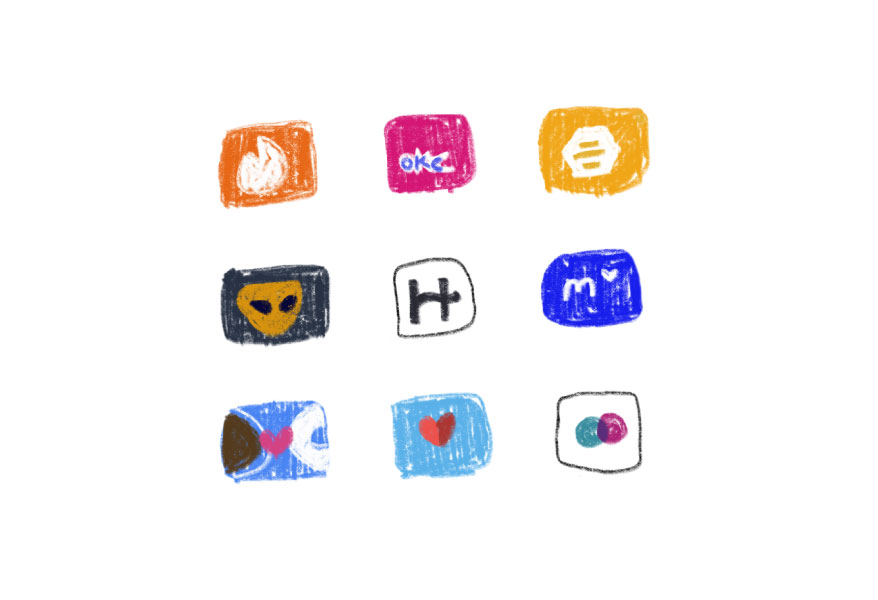
PROJECT PROCESS: INTERVIEWS, FOCUS GROUPS, OBSERVATIONAL STUDY
Our team interviewed participants one-on-one about their experiences with online dating. We created research collection activities, such as a dating timeline to gather data on sentiment and events over a period of time. In another activity we had the participants take part in a card sort where they sorted reaction words (positive and negative adjectives) to describe various online dating platforms in order for us to learn about users’ attitudes toward an app’s design.
We also conducted focus groups where we recruited participants through the apps and through word of mouth. We spoke with separate groups of straight and LGBTQ participants. Groups were moderated to speak about their experiences. Some questions to facilitate conversation included:
How do you choose who you go out on a date with?
What events in your life have increased or decreased app use?
What is your outlook on online dating?
The final round of research involved observational studies. We observed a couple on a first date and gave them questionnaires to fill out before and after the date. The goal of the observational study was to observe whether what the participant says or thinks align with their behaviors.
RESEARCH PROGRESSION
As our research progressed, however, we recognized that our research questions and the areas of study had evolved based on the data we gathered. Our revised research questions became:
Main Research Question:
How do people navigate online dating when their goal is to establish a successful relationship?
Subquestions:
How do people's goals (particularly if they are seeking a successful relationship) affect their online dating behavior?
What actions or activities do people take or engage in when they are trying to find a successful relationship through online dating? How do people’s goals (particularly if they are seeking a successful relationship) determine their selection of a specific dating platform?
Our team interviewed participants one-on-one about their experiences with online dating. We created research collection activities, such as a dating timeline to gather data on sentiment and events over a period of time. In another activity we had the participants take part in a card sort where they sorted reaction words (positive and negative adjectives) to describe various online dating platforms in order for us to learn about users’ attitudes toward an app’s design.
We also conducted focus groups where we recruited participants through the apps and through word of mouth. We spoke with separate groups of straight and LGBTQ participants. Groups were moderated to speak about their experiences. Some questions to facilitate conversation included:
How do you choose who you go out on a date with?
What events in your life have increased or decreased app use?
What is your outlook on online dating?
The final round of research involved observational studies. We observed a couple on a first date and gave them questionnaires to fill out before and after the date. The goal of the observational study was to observe whether what the participant says or thinks align with their behaviors.
RESEARCH PROGRESSION
As our research progressed, however, we recognized that our research questions and the areas of study had evolved based on the data we gathered. Our revised research questions became:
Main Research Question:
How do people navigate online dating when their goal is to establish a successful relationship?
Subquestions:
How do people's goals (particularly if they are seeking a successful relationship) affect their online dating behavior?
What actions or activities do people take or engage in when they are trying to find a successful relationship through online dating? How do people’s goals (particularly if they are seeking a successful relationship) determine their selection of a specific dating platform?
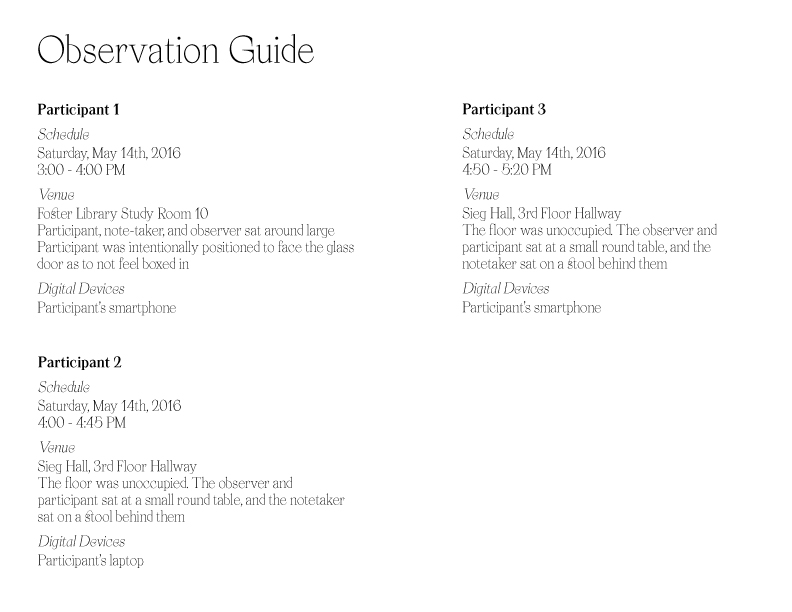
Research Guide for Observational Studies
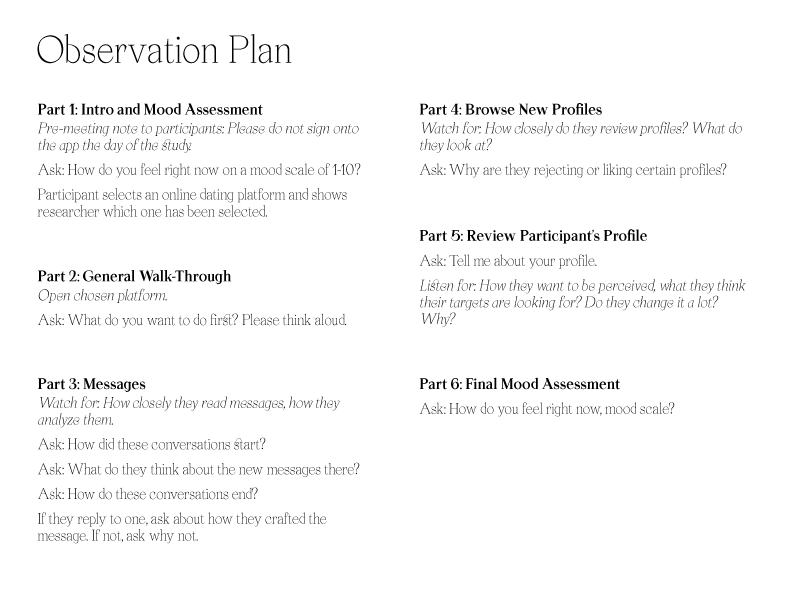
Research Plan for Observational Studies
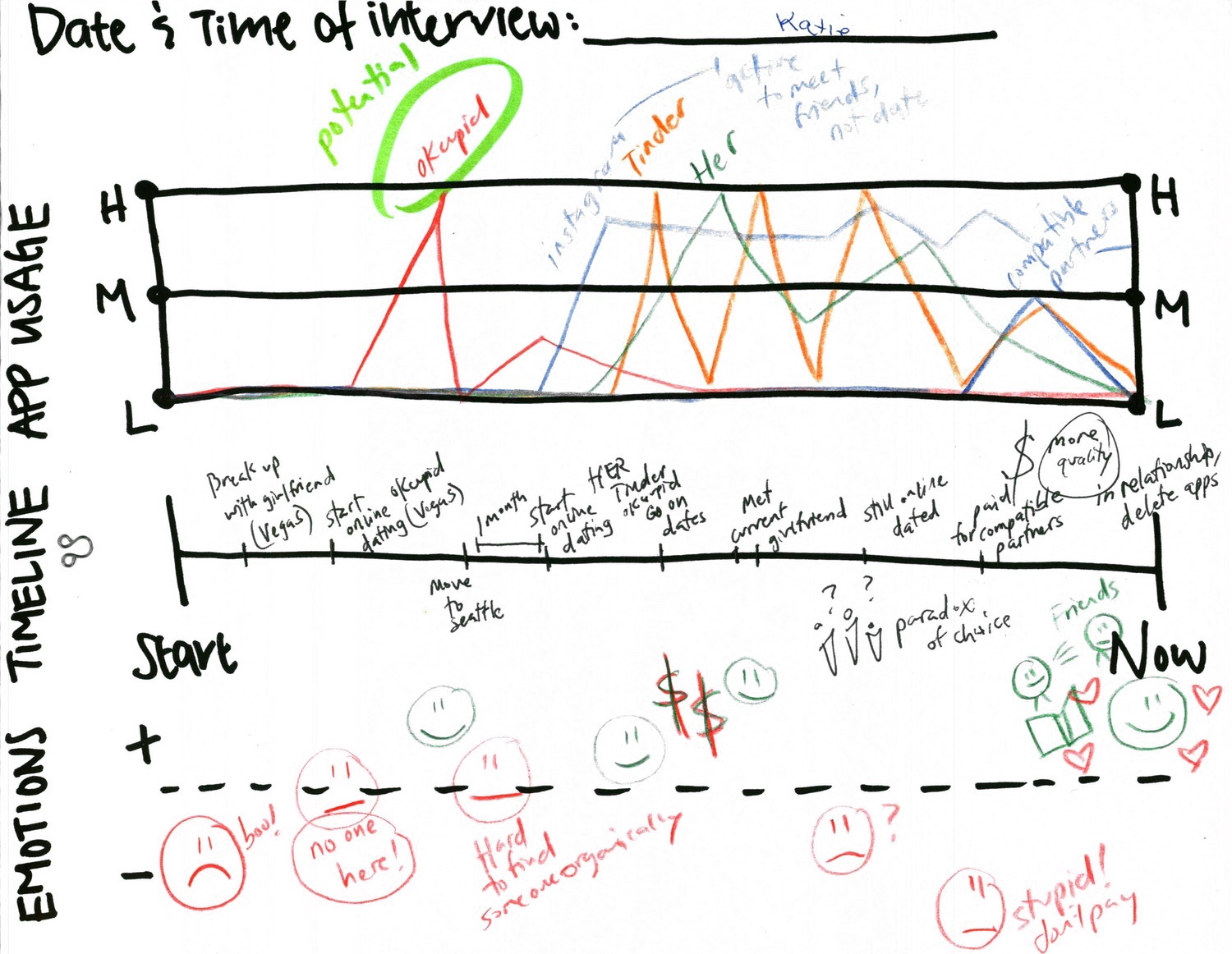
Dating Timeline
THEORY
My team developed a theory on a hierarchy of dating needs based on our participants’ online dating attitudes and behaviors. The hierarchy is based on Maslow’s Hierarchy of Needs. We found an equivalent hierarchy among our participants’ online dating attitudes and behaviors.
The first two stages occur in what we are calling the “Pre-Reality” stage, and it was a fairly consistent, well-understood set of steps. In the Physiology stage, participants listed very basic needs for their potential mates in a dating app - physical attractiveness was primary, but they also talked about their baseline “checklist” of requirements like age or education level. To get out of this stage, people need to initiate contact through whatever means available on the app, such as message, like, or match. During the Safety and Security stage, participants have to scrutinize their potential date on a number of factors, because they do not have social context for assessing them.
Because these first two stages occur before the other person feels real, the rate at which people accept and reject other people is heightened, contributing to a “throwaway culture” bemoaned by many participants. To mitigate the effect of throwaway culture, they need to get out of the app. This can mean giving out their phone number, or most often, arranging to meet in person.
The next stages are the “Reality” stages, and are where much of the strife around online dating occur. Stage three is Belonging, which is very emotionally risky and confusing. This is where the couple is getting to know each other, starting with the big reveal - is the person they meet in the coffee shop, the same as the person they have been texting? Each person must align with their online identity, be vulnerable, reveal major pieces of information about themselves, and spend increasing amounts of time together. As scary as this phase is, it can also be very exciting - it is an emotional rollercoaster. The clearest way to the next phase is a clarifying conversation with agreement on relationship goals.
In the Esteem stage, the pair of people know each other, like each other a lot, and begin to put together their life as a couple. They integrate each other into their lives. This might mean labeling the relationship with titles, or including each other in their social circles. They are “going public” with their relationship and trying to make it work. When they get out of this stage to Couple Actualization, they are leaving the world of dating, and focusing on their relationship together.
FINDINGS
Users are pessimistic about online dating, but continue to do so.
Safety has many definitions in online dating.
“Ghosting” is a specific etiquette that has emerged in unmatching with people.
Using apps can serve as a boost of confidence.
Testing behaviors determine how and if people advance through the stages until couple actualization.
Dating platforms are a form of entertainment and a cure for boredom.
Users have a vastly different set of goals, which influence online dating behavior and a mismatch in goals poses a challenge in online dating.
Dating Options—Too many options overwhelmed some users, too little made the apps seem slow. Aim to find the right balance of options with a unique way of filtering.
Reinforcing Behaviors—Design considerations should be carefully thought out to increase dating success, not dating possibilities.
Varying reasons for use and commitment levels—Designers should find a way to identify the varying types of commitment that users have towards the app and group those users together.
My team developed a theory on a hierarchy of dating needs based on our participants’ online dating attitudes and behaviors. The hierarchy is based on Maslow’s Hierarchy of Needs. We found an equivalent hierarchy among our participants’ online dating attitudes and behaviors.
The first two stages occur in what we are calling the “Pre-Reality” stage, and it was a fairly consistent, well-understood set of steps. In the Physiology stage, participants listed very basic needs for their potential mates in a dating app - physical attractiveness was primary, but they also talked about their baseline “checklist” of requirements like age or education level. To get out of this stage, people need to initiate contact through whatever means available on the app, such as message, like, or match. During the Safety and Security stage, participants have to scrutinize their potential date on a number of factors, because they do not have social context for assessing them.
Because these first two stages occur before the other person feels real, the rate at which people accept and reject other people is heightened, contributing to a “throwaway culture” bemoaned by many participants. To mitigate the effect of throwaway culture, they need to get out of the app. This can mean giving out their phone number, or most often, arranging to meet in person.
The next stages are the “Reality” stages, and are where much of the strife around online dating occur. Stage three is Belonging, which is very emotionally risky and confusing. This is where the couple is getting to know each other, starting with the big reveal - is the person they meet in the coffee shop, the same as the person they have been texting? Each person must align with their online identity, be vulnerable, reveal major pieces of information about themselves, and spend increasing amounts of time together. As scary as this phase is, it can also be very exciting - it is an emotional rollercoaster. The clearest way to the next phase is a clarifying conversation with agreement on relationship goals.
In the Esteem stage, the pair of people know each other, like each other a lot, and begin to put together their life as a couple. They integrate each other into their lives. This might mean labeling the relationship with titles, or including each other in their social circles. They are “going public” with their relationship and trying to make it work. When they get out of this stage to Couple Actualization, they are leaving the world of dating, and focusing on their relationship together.
FINDINGS
There is a disconnect between people’s online dating and “real life” identities.
Safety has many definitions in online dating.
“Ghosting” is a specific etiquette that has emerged in unmatching with people.
Using apps can serve as a boost of confidence.
Testing behaviors determine how and if people advance through the stages until couple actualization.
Dating platforms are a form of entertainment and a cure for boredom.
Users have a vastly different set of goals, which influence online dating behavior and a mismatch in goals poses a challenge in online dating.
IMPLICATIONS FOR APP DESIGNERS
Reinforcing Behaviors—Design considerations should be carefully thought out to increase dating success, not dating possibilities.
Varying reasons for use and commitment levels—Designers should find a way to identify the varying types of commitment that users have towards the app and group those users together.
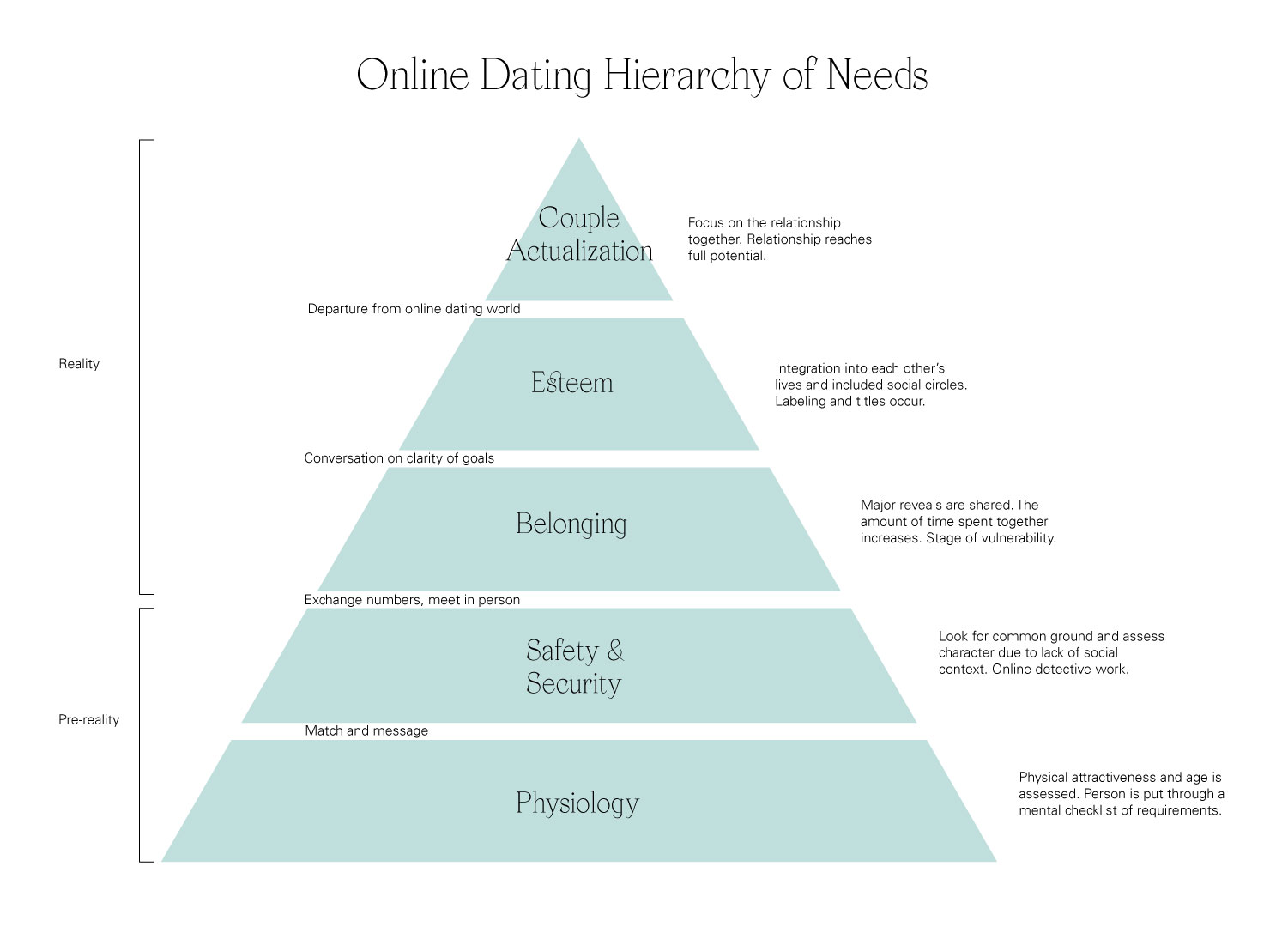
Online Dating Hierarchy of Needs
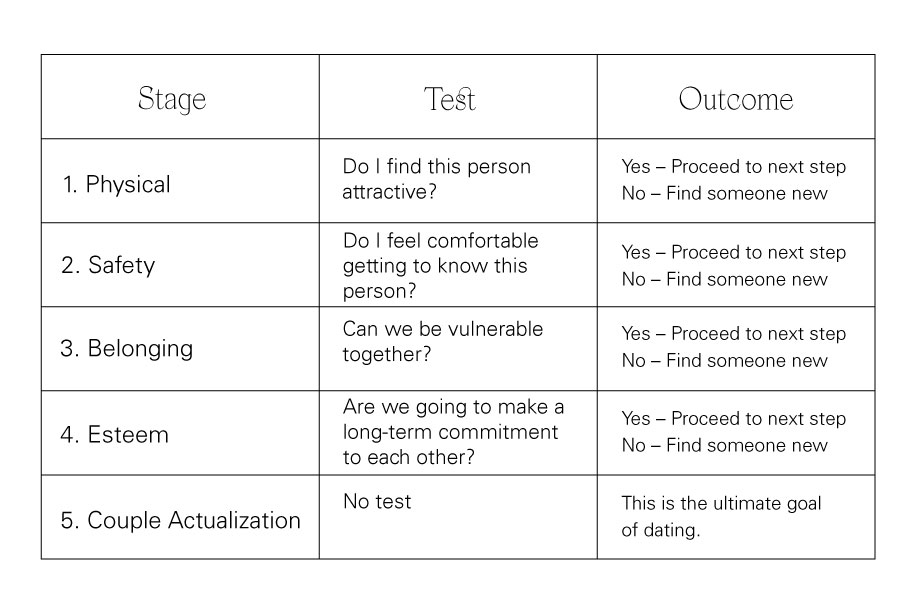
The Stages of Online Dating
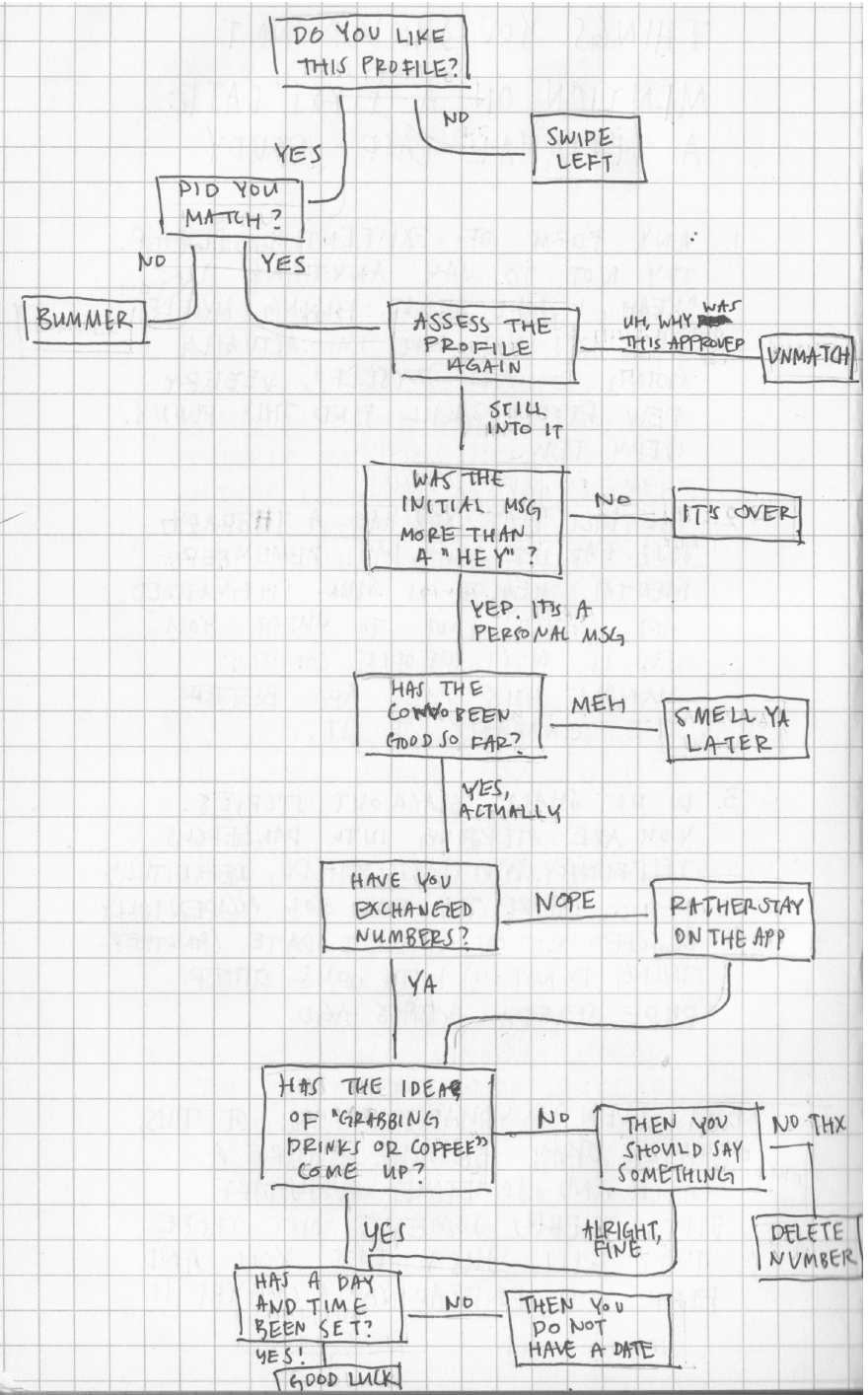
A flow chart comic of online dating